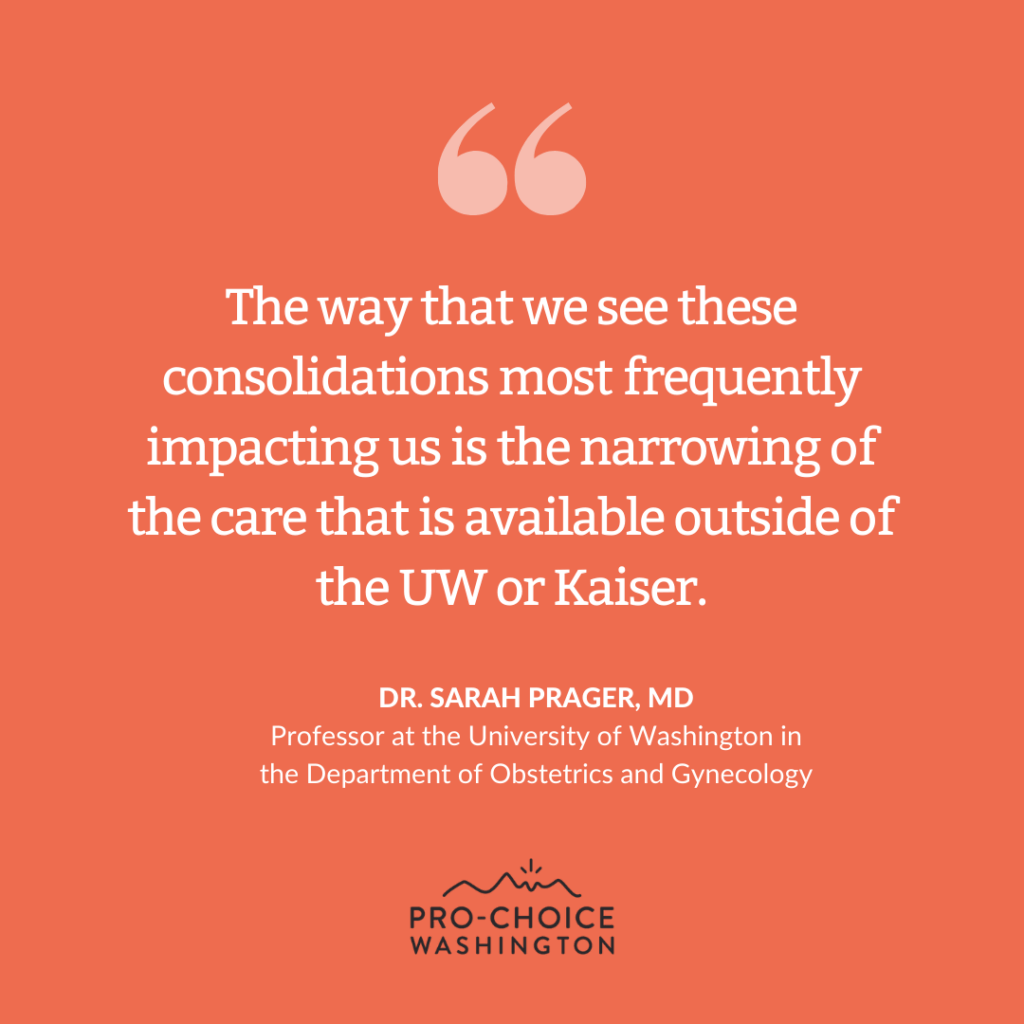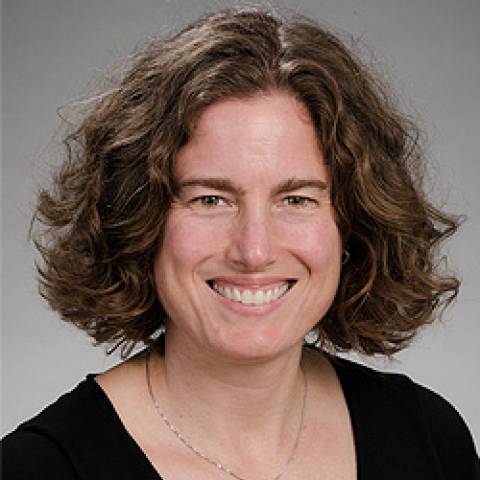With the rise of health care entity consolidations across Washington state, patients are often left with fewer options for the health care they are seeking, particularly for patients seeking reproductive care, end-of-life care, or gender-affirming care.
The impacts of these consolidations can also restrict the ability of abortion providers to administer care to their patients.
That is why Pro-Choice Washington is advocating for the Keep Our Care Act Bill (SB 5241). This bill ensures that hospital consolidations would improve, rather than harm, care.
In Washington, these health entity consolidations receive minimal oversight, allowing large health care systems to dictate patients’ access to care.
Clareta Tsang, a Masters in Public Health student, interviewed a local abortion provider, Sarah W. Prager, MD, MAS, about how consolidations impact her work.
This is an excerpt from an interview that has been edited for length.
Pro-Choice Washington: What are some of the impacts that this continual trend of hospital consolidations have had on patient access to abortion care in Washington?
Dr. Prager: It continues to make it more challenging for people living outside of significantly urban areas, and even sometimes for people living in urban areas to access that care. In Seattle proper, you have the University of Washington (UW) and Kaiser, and that’s it in terms of hospitals where you can get an abortion. If there is a miscarriage, then you can also get an abortion at Swedish and at some other places.
Pro-Choice Washington: What are some of the impacts that you have seen on access to some of the other types of reproductive care and gender-affirming care because of these consolidations?
Dr. Prager: The consolidations have reduced the number of secular hospitals where people can get care, so that’s going to impact abortion; other reproductive health care, including tubal ligations sometimes; or sometimes types of contraception. It can impact miscarriage care; it can impact LGBTQI care; and it can also impact end-of-life care.
Pro-Choice Washington: How have these consolidations impacted your clinic, especially after the Dobbs decision last year?
Dr. Prager: We do have more people coming in from out of state and so for people who previously had a little bit of a challenge getting abortion care. Now it’s more challenging just because there are more people coming from other places that also need care.
Generally speaking, the places that have the most consolidations are also more rural and a lot of that is happening in Eastern Washington, which is our closest border to a state that has no abortion access (so Idaho). You know patients coming over from Idaho still kind of have to come to Seattle because there isn’t great access to abortion in the Spokane area and along that eastern border.
Pro-Choice Washington: Could you talk a little bit about how the Dobbs’ decision impacted you personally and how you handled it?
Dr. Prager: I was scheduled in the operating room (OR) at UW; I was doing abortions. The news came down while I was doing the morning checklist with the OR team about all of the patients, and it felt really chaotic. It felt good to be able to⸺just be able to be proactive in doing abortion cases that day. It also felt traumatizing, and you know there were people coming into our OR throughout the day to express support.
Pro-Choice Washington: Could you talk a little bit about how these consolidations have impacted you or other staff or some of your colleagues?
Dr. Prager: The way that we see these consolidations most frequently impacting us is the narrowing of the care that is available outside of the University of Washington or Kaiser. So the onus for providing certain types of care is really on us.

Dobbs really underscored that as well, on a national level. I and my colleagues can provide this care, and we want to provide this care. But it also feels like a pressure cooker a little bit because so many other people within and without Washington state won’t or don’t provide this care. I think we feel really privileged that we are able to offer full spectrum healthcare for patients, and with that privilege comes responsibility.
Pro-Choice Washington: As a provider who does work at a hospital that has an affiliation with a larger health system and feels that there have been some benefits from that relationship, can you talk about why you believe that KOCA is necessary?
Dr. Prager: There’s no good way or easy way for a patient to look up what reproductive health services are or are not provided by a clinic or a hospital system because they are required to have a statement, but it can be incredibly general. And in an emergency, that’s not going to matter to anyone anyway.
I know there’s a lot of consternation also about what this would look like because financially, medicine is really challenging. And a lot of smaller groups are needing to merge in order to not go bankrupt, and so there really is this like—or at least I’m hearing from other colleagues—huge concerns about KOCA because they worry that it’s going to be bad for the doctors. And then by extension, for their patients. You know if doctors go bankrupt, then they can’t see their patients either. And I do think there are two sides to it.
I personally tend to side with wanting to focus first on what’s going to benefit patients, rather than what’s going to benefit providers. But I’m also speaking from a position of privilege where I work for a big university and I’m not at risk.
Pro-Choice Washington: If passed, what impact do you believe KOCA will have on patients and providers?
Dr. Prager: I believe that it’s actually really going to be beneficial for patients and not detrimental to providers.
Pro-Choice Washington: What do you think will happen, to patients, providers or other clinics, if KOCA is still not passed during this upcoming legislative session?
Dr. Prager: We are seeing a lot of practices having to go bankrupt, and so doctors are losing their jobs, and then having to either get jobs with you know, big health systems and/or practice in places where they don’t have full scope even though they would prefer to have more of a scope of practice. And so I think that that theoretically could have really negative impacts on both providers and on patients.

Sarah W. Prager, MD, MAS is a professor at the University of Washington in the Department of Obstetrics and Gynecology. She specializes in complex family planning.
Dr. Prager has been at the University of Washington for 17 years where she is the director of the Family Planning Division and Family Planning Fellowship. She is board certified with the American Board of Obstetrics and Gynecology.
Dr. Prager provides the full spectrum of general obstetrics and gynecologic care. Her special clinical focus is complex family planning, helping women navigate their needs around abortion, contraception and miscarriage. She believes in working with individuals to provide them with the safest, most effective solution to their healthcare wants and needs.

Clareta Tsang is a Master’s of Public Health student at the University of Washington.
She has been with Pro-Choice Washington since September 2023.
She hopes to use her education and experience to pursue opportunities to expand and protect access to reproductive health care.

